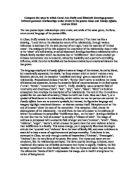Compare the ways in which Carol Ann Duffy and Elizabeth Jennings present intimate personal relationships under strain in the poems Close and Family Affairs
Compare the ways in which Carol Ann Duffy and Elizabeth Jennings present intimate personal relationships under strain in the poems Close and Family Affairs.
Andrew Kidd
The two poems depict relationships under strain, and while of the same genre, the form, structure and language of the poems differ.
In Close, Duffy reveals the dominance of a former partner ("You have me like a drawing...") and hints at the clandestine nature of the relationship, through various references to darkness ("In the dark journey of our night,") and the mention of "a hired room". The ambiguity of the title supports the uncertainty of the relationship: does it refer to the "close" of a relationship, or actual closeness? Jennings describes a relationship with a female family member which has become lost to "indifference". Both show strained yet intimate connections: one is romantic, tainted by instability and a partner's controlling influence, while the other is familial and has become strained by an emotional distance that has grown.
The language employed in Family Affairs creates an image of two women, bound by blood, but emotionally separated; the simile, "as fussy women stitch at cotton" evokes a very feminine picture, and the metaphor "umbilical cord long" gives a maternal feel to the relationship. Prepositional phrases ("too far", "further than") serve to reinforce the theme of distance and separation, as does the semantic field of unconnectedness in the final stanza ("untie", "bonds", "unconnected", "sever"). Duffy, similarly, uses a semantic field of uncertainty and dreariness ("dark", "lost", "pity", "ache", "black", "blind") to build an atmosphere than envelops the description of her relationship. The coin in line 13 could be a symbol for her own lack of certainty ("How the hell / can I win. How can I lose."), or a symbol of fate/chance in the relationship, which neither her nor her partner can control. In Family Affairs there are no concrete symbols, but instead, the figurative language and imagery highlight emotional distance - an abstract concept itself. Metaphors such as "the end of summer" show the state of the connection. This metaphor, I feel, shows the disintegration of the relationship - the shift from the heat of summer to the coldness of winter: the coldness the personified "Indifference lays... on the heart". Jennings clarifies in the next line that the "end of summer" is actually a "climate of mind". The image of coldness is juxtaposed with a semantic field of anger and heat ("summer", "wrath", "blaze, "violence", "anger", "warm"), which stresses the poet's view that even violence is better than indifference in a family. This seems strange, yet it poignantly illustrates Jennings's attitude that "quarrels" and "violence" lie at the heart of family life, and some turbulence is essential to keep a sense of togetherness and perhaps normality. Turbulence is too, conveyed in Close, not only through a series of imperatives ("Undress", "Dress again", "Undress") but the very form of the poem: free verse. The rhyme and meter are not consistent, like the relationship portrayed. The form used by Jennings, is indeed, more traditional. She makes use of iambic pentameter and rhyme to signify, I believe, the link between herself and the other family member: like the rhyme and meter they are bound. The alliterative "bonds of birth" emphasises this image, and in itself it strengthens the notion of being bound.







